REVIEW: THE TALOS PRINCIPLE
SPOILER WARNING: Never mind the usual words of caution one would expect to receive ahead of a gaming review about possible plot twists or story details, discussion of The Talos Principle on any level, from any angle has the potential to drastically dilute the entire game’s impact on you as a player. Tread lightly!
What does it mean to be a “person”? What is consciousness? Is happiness the most important aspect of life? Is wealth? Love? Faith? Existence?
Human beings have been asking each other these questions since we had the words to ask them with, and they’ve been echoing through our discussions, songs, poems and stories throughout history. In our search for answers we often experience journeys of discovery through the lens of heroes and scholars that venture through trials, hardships and revelations spanning the entire spectrum of story arcs and genres.
The Talos Principle, a first-person puzzle game made in late 2014 from the developers who created Serious Sam of all things, removes the mediator from this equation and instead takes a forthright approach by asking the player in plain English (or whatever language the player happens to know) to answer all these big questions directly.
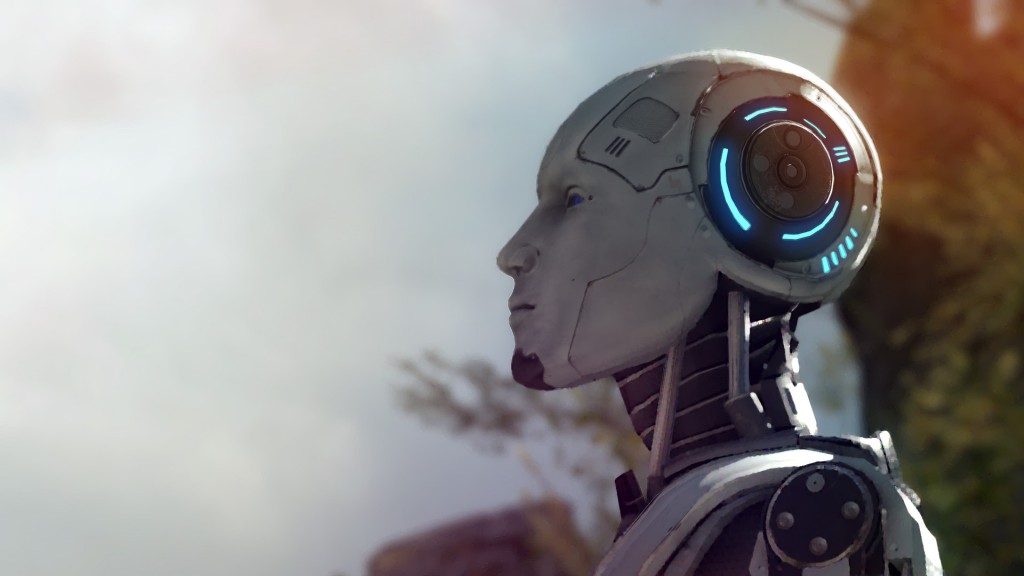
Is this a person? Are you?
Your first reaction to such an idea is probably the same as mine was? “Dry, rudimentary philosophy discussion in a video game? There has to be more to it than that!” Well, there is. In fact there is quite the game in this game, even though it somewhat contrasts a bit with everything I’ve told you about it so far. (We’ll come back to that).
Lateral thinking is the order of the day as you move in and out of abandoned ruins filled with all the boxes, buttons, lasers, turrets and forcefields you’ve come to expect from games like Myst and Portal. You’ll find yourself thinking inside, outside and all around the box as you try to outsmart the architecture and landscape in order to bounce beams of lights to their intended destinations. You’ll be holding your breath as you wait for floating mines to pass you by on their mindless patrols before darting past them to collect keys and the tools you need to solve the puzzle and collect a prize (which is itself just another piece of yet another puzzle!)
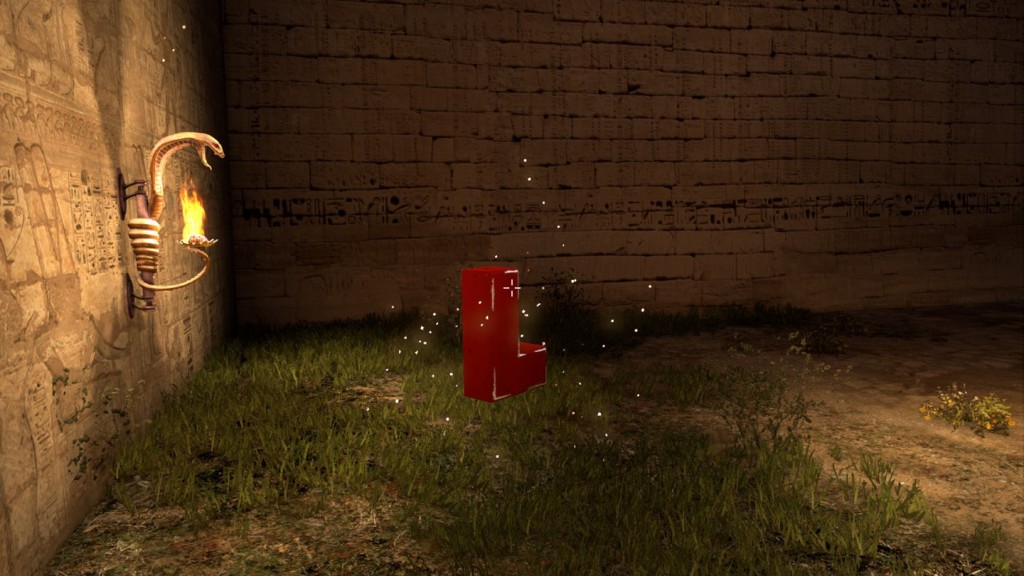
No seriously, the prizes are Tetris blocks!
The puzzles are great. Let me just get that off my chest. You aren’t given much in the way of abilities besides running, jumping, climbing ladders and lifting boxes, but despite that (and possibly because of it) the design of each labyrinth you enter is remarkably well thought out. The early puzzles deliver dozen of delicious “ah-ha!” moments that embolden you to keep pressing forward while slowly ramping up the complexity. By the time you reach the final trials you will have hardly noticed how in-depth each task has become despite spending nearly a half hour working your way step by step through a single puzzle.
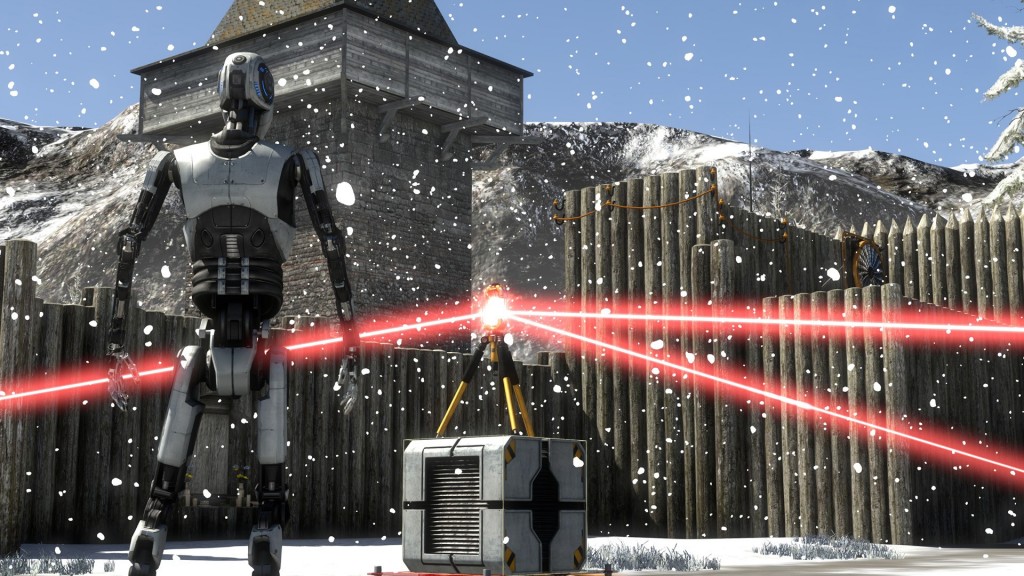
Boxes and lasers. I got this!
Soaring over all of this is a booming voice from a self proclaimed omnipotent observer named Elohim who regards your avatar (a mute android) as “his child”. It’s not quite GlaDOS if that’s what you were expecting. Much of the charming, jaded cat-and-mouse banter from Aperture Science’s deranged mechanical matriarch is instead replaced by a commanding yet seemingly compassionate God-like voice that showers you with praise and promises of eternal life if you complete its tasks, as well as warning you of the temptation of… well, doing anything else.
That “anything else” might include climbing a foreboding tower that stretches from the ground of the game’s hub world up into the sky amidst a swirling vortex of blacken clouds and flashes of lightning. Serving as the “extra hard” challenges the designers chose to lock a possibly better ending behind, Elohim’s early warnings to steer clear of the tower really call to mind a sort of forbidden fruit symbolism that’s nearly impossible to resist! For me it was a bit of a throw back to the kind of headspace I remember being in when I played The Stanley Parable. “Go in the left door? Why? Because you say so? Pfft, right door it is!”
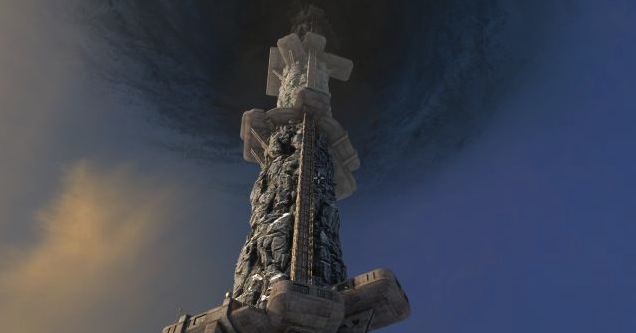
Telling me not to is only making me want to more!
But his is not the only voice you will encounter as you hunt and solve your way through the worlds laid out for you. Spread about everywhere are terminals that contain the fragmented remains of what could be thought to be the human race’s collective online history, semi-corrupted by possibly countless eons of deterioration following our species’ extinction at the hands of some nameless catastrophe. Everything from emails, blogs, audio diaries, to even historical documents and literature considered ancient even by present-day standards. It’s a clever device for world building and it’s all there in bits an pieces for you to sink your teeth into (if reading large chunks of text doesn’t put you off too much that is).
Also hidden in these terminals is evidence of some kind of cyber primordial soup. If you like your philosophical debates with an artificial intelligence slant to it, the entity known as Milton (who is little more than a sentient DOS command prompt) will be sure to keep the cogs in your head that aren’t dedicated to figuring out puzzles from rusting. I’ll confess that I haven’t spent much time contemplating “the big picture” in my thirty or so years on this planet and yet I found my arguments with Milton to be one of the high points of the whole game. As a player sitting at a computer piloting an AI robot through the landscape of a video game (which we are to believe is a simulation itself as the occasional on-purpose graphical glitches seemed to imply) and discussing philosophy 101 with a different sentient AI within yet another computer, I must have sat staring at the monitor within my monitor for who knows how long trying think of a way to answer the question “what is a person?” And I loved it!
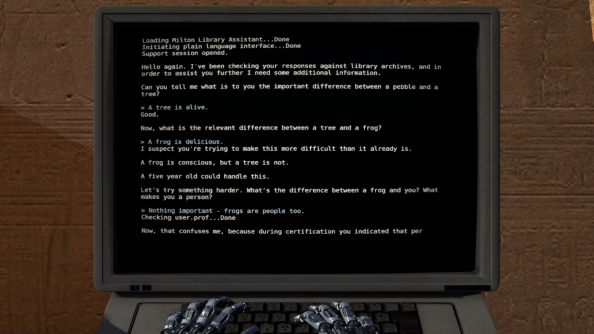
“C:\ … C:\DOS RUN … RUN DOS, RUN!”
One thing that The Talos Principle is not, is more than the sum of its parts. The puzzle solving; the conversations with Milton; the question of whether or not to heed the words of Elohim. They are all brilliantly executed yet heavily segregated from each other. At no point does finishing a puzzle feel like it really has anything to do with the voice in the sky or the words on the screens. If you are in a game like The Talos Principle because the intangible concepts like philosophy and faith have attracted your interests then slamming into the busywork of moving blocks and fans and fitting puzzle pieces together just to get to that next story-rich text file is probably going wear on you after a while. Likewise if you are here to get yourself some puzzles solved and prove what a mean problem-solving android you really are, wading through dry page after page of ancient Greek or Egyptian history or some scientist’s experiment results might bore you into logging out for good.
As for the gaming flourishes, the soundtrack is excellent. Calming, tranquil scores will float unobtrusively behind you as you ponder the solutions to each maze. The sounds of the world are practical and only reveal their cyber-simulated origin when they need to. The graphics are equally as gorgeous if somewhat repetitive after a while. (Let’s face it, if you’ve seen one set of ruins or pyramids, you’ve seen them all.) One thing I was somewhat disappointed by was the amount of empty space wasted on the vast open hub world areas. Only on a few occasions did wandering off of Elohim’s chosen path yield any exploration rewards, which put a bit of a damper on my curiosity to hunt around for secrets.
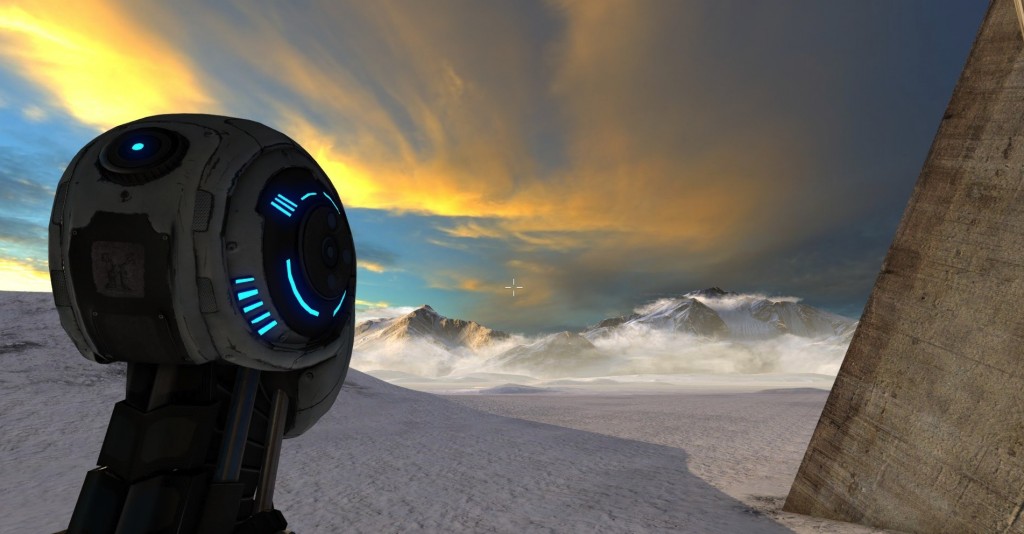
There could be so much out there… but there isn’t.
I must say, I enjoyed The Talos Principle a lot. It delivered three or four different avenues of storytelling and gameplay that each got me thinking in a different way, which is a testament to the gaming medium regardless of whether or not all the pieces came together as a whole. It’s certainly a robust amount of content that rewards those who invest enough thought into it.
The game can be found on Steam and is slated to come out on the PS4 and Android devices in the next few months.
The game isn't ashamed to just come right out and ask you some basic philosophical questions most other games only approach through an indirect narrative, and the puzzles are finely tuned with a well balanced difficulty curve. Though disjointed, all the pieces of this game will give you a lot to think about.

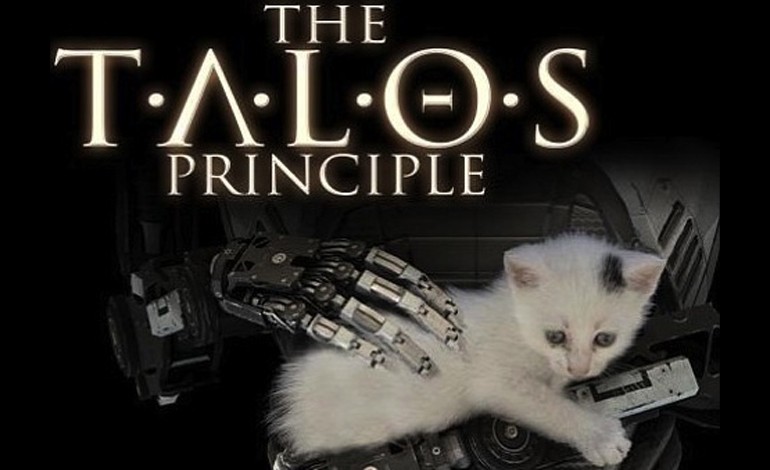






I absolutely agree on the disconnect of gameplay elements. The entire game could be played without ever reading a single one of the computer panels.
Which is disappointing because it appears that they were trying to appeal to the broadest audience, but realistically, anyone playing a puzzle game of this complexity is going to have some level of patience of amusing text conversations.
One of the high points for me, though, was my irritation with the text philosophy’s multiple choice answers when obviously the answers do not provide sufficient enough answers. The moment I reached a point where I thought ‘Surely the writers must have realized that making me choose 1-4 default answers does not satisfy such a complicated question’ that was ALMOST VERBATIM ONE OF MY AVAILABLE OPTIONS. They were clearly relishing in pestering me and I loved them for it.